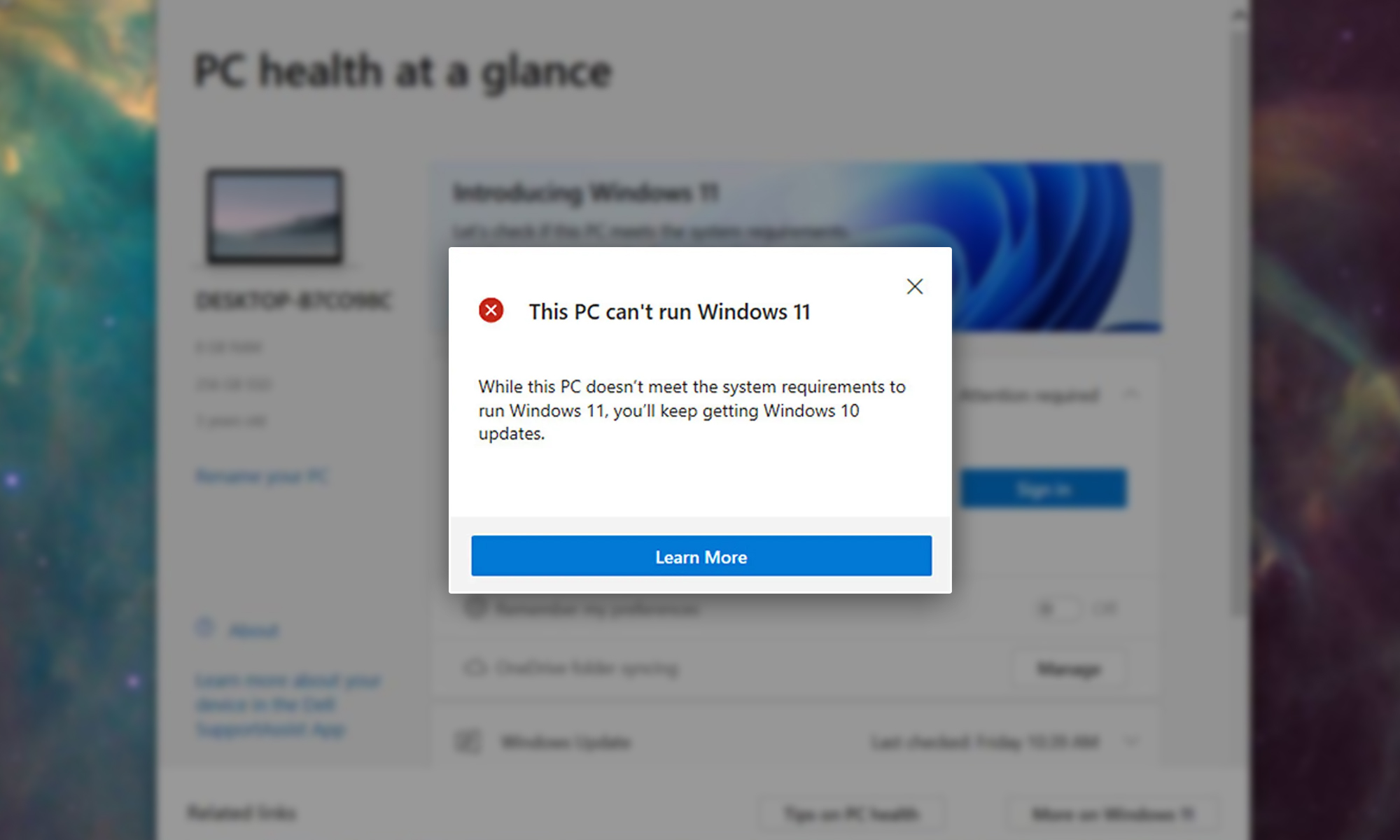News
Windows 11 Won’t Support Many Modern PCs – Is Yours Among Them?
Users whose PCs don’t meet the system requirements can continue to use Windows 10, whose official support ends October 2025.

Microsoft has officially unveiled the next-generation version of its operating system, called Windows 11. In addition to a brand-new look, Windows 11 introduces a whole host of productivity improvements, including new ways to manage applications, support for widgets, and the integration of Microsoft Teams into the taskbar.
The only problem is that many Windows 10 users may not be able to upgrade to Windows 11 — even if their PCs are just a few years old. Why? Because they don’t meet the Windows 11 minimum system requirements:
Windows 11 System Requirements
- Processor: 1 gigahertz (GHz) or faster with 2 or more cores on a compatible 64-bit processor or System on a Chip (SoC)
- Graphics Card: DirectX 12 compatible graphics / WDDM 2.x
- Memory: 4 GB RAM
- Storage: 64 GB or larger storage device
- TPM: Trusted Platform Module (TPM) version 2.0
If your motherboard is equipped with a TPM module, then the Windows 11 system requirements probably don’t seem too strict to you. Well, that’s because you don’t know that Microsoft is officially supporting only a relatively small number of Intel and AMD processors, regardless of how powerful they are.
For example, Intel processors compatible with Windows 11 date back to only mid-2017. The situation is even worse when it comes to AMD processor, whose support start with 2nd gen Ryzen (2018). Microsoft has decided to take this drastic step to deliver the most secure and stable Windows experience possible.
Also Read: Microsoft To Finally Retire Internet Explorer In 2022
You can verify if your PC meets the minimum system requirements using the official PC Health Check app (not available at the time of writing this article because Microsoft has decided to temporarily remove it).
Users whose PCs don’t meet the system requirements can continue to use Windows 10, whose official support ends October 2025. While Microsoft still hasn’t announced an official release date for the next version of Windows, recent reports indicate that date will most probably be October 20, 2021.
News
Rabbit Expands Hyperlocal Delivery Service In Saudi Arabia
The e-commerce startup is aiming to tap into the Kingdom’s underdeveloped e-grocery sector with a tech-first, locally rooted strategy.

Rabbit, an Egyptian-born hyperlocal e-commerce startup, is expanding into the Saudi Arabian market, setting its sights on delivering 20 million items across major cities by 2026.
The company, founded in 2021, is already operational in the Kingdom, with its regional headquarters now open in Riyadh and an established network of strategically located fulfillment centers — commonly known as “dark stores” — across the capital.
The timing is strategic: Saudi Arabia’s online grocery transactions currently sit at 1.3%, notably behind the UAE (5.3%) and the United States (4.8%). With the Kingdom’s food and grocery market estimated at $60 billion, even a modest increase in online adoption could create a multi-billion-dollar opportunity.
Rabbit also sees a clear alignment between its business goals and Saudi Arabia’s Vision 2030, which aims to boost retail sector innovation, support small and medium-sized enterprises, attract foreign investment, and develop a robust digital economy.
The company’s e-commerce model is based on speed and efficiency. Delivery of anything from groceries and snacks to cosmetics and household staples is promised in 20 minutes or less, facilitated by a tightly optimized logistics system — a crucial component in a sector where profit margins and delivery expectations are razor-thin.
Despite the challenges, Rabbit has already found its stride in Egypt. In just over three years, the app has been used by 1.4 million customers to deliver more than 40 million items. Revenue has surged, growing more than eightfold in the past two years alone.
Also Read: Top E-Commerce Websites In The Middle East In 2025
CEO and Co-Founder Ahmad Yousry commented: “We are delighted to announce Rabbit’s expansion into the Kingdom. We pride ourselves on being a hyperlocal company, bringing our bleeding-edge tech and experience to transform the grocery shopping experience for Saudi households, and delivering the best products – especially local favorites, in just 20 minutes”.
The company’s growth strategy avoids the pitfalls of over-reliance on aggressive discounting. Instead, Rabbit leans on operational efficiency, customer retention, and smart scaling. The approach is paying off, having already attracted major investment from the likes of Lorax Capital Partners, Global Ventures, Raed Ventures, and Beltone Venture Capital, alongside earlier investors such as Global Founders Capital, Goodwater Capital, and Hub71.
























